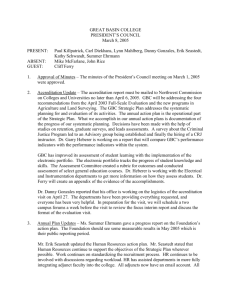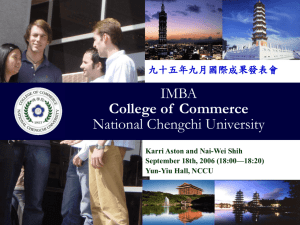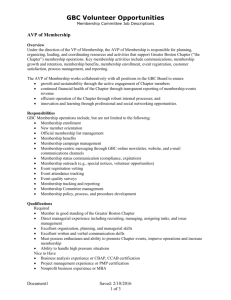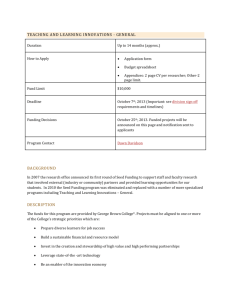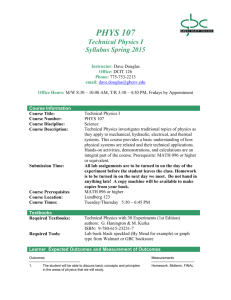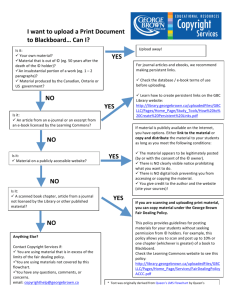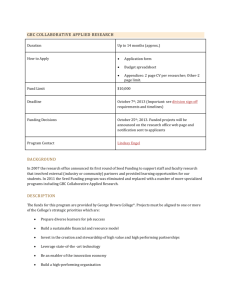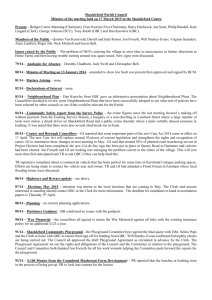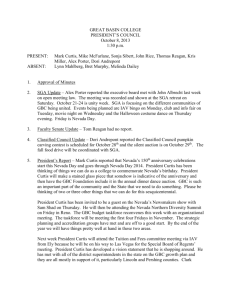OBJECTIVE 3.3.a - Great Basin College
advertisement
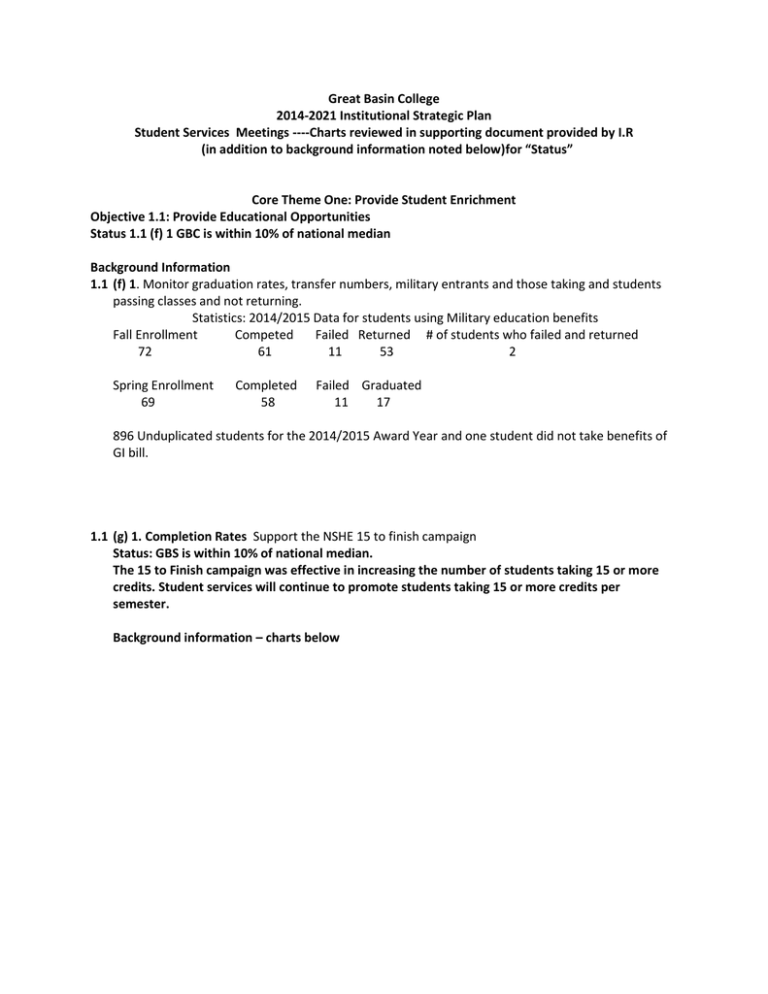
Great Basin College 2014-2021 Institutional Strategic Plan Student Services Meetings ----Charts reviewed in supporting document provided by I.R (in addition to background information noted below)for “Status” Core Theme One: Provide Student Enrichment Objective 1.1: Provide Educational Opportunities Status 1.1 (f) 1 GBC is within 10% of national median Background Information 1.1 (f) 1. Monitor graduation rates, transfer numbers, military entrants and those taking and students passing classes and not returning. Statistics: 2014/2015 Data for students using Military education benefits Fall Enrollment Competed Failed Returned # of students who failed and returned 72 61 11 53 2 Spring Enrollment 69 Completed 58 Failed Graduated 11 17 896 Unduplicated students for the 2014/2015 Award Year and one student did not take benefits of GI bill. 1.1 (g) 1. Completion Rates Support the NSHE 15 to finish campaign Status: GBS is within 10% of national median. The 15 to Finish campaign was effective in increasing the number of students taking 15 or more credits. Student services will continue to promote students taking 15 or more credits per semester. Background information – charts below GBC saw an increase of 10.6 percentage points between Fall 2012 and Fall 2014. *Information from NSHE 1.1 (g) 2. Completion rate Status: As faculty refer students via Early Alert, students are immediately contacted and referrals made as needed. Background information The Early Alert Program GBC utilizes the People Soft-early alert features/tables to gather information on students at risk of being unsuccessful. Students identified by faculty as having difficulties academically are contacted and provided the following: Resources both on campus and off campus which students can utilize to improve their academic success and to address individual concerns/barriers they may be dealing with. Information on study skills, time management, and stress management etc.…. Encouragement and advice pertaining to academic success and the student’s studies. The Early Alert program is designed to increase the retention rate of students on a semester to semester basis, and ultimately the overall graduation rate of GBC students. This program has recently lost a fulltime coordinator, as well as a part-time peer mentor/success coach as a result of budget reductions. Currently, a key team of GBC staff respond to early alerts as they are submitted by faculty. These staff members have been able to keep the GBC Early Alert program operational despite the funding cutbacks. In the future there will, hopefully, be opportunities to expand the program to address the growing needs of the GBC student population. A retention coordinator is proposed for FY 2017-2018 with proposed registration fee increases. 1.1 (g) 3. <30 credit Pathways Skills Certificates Status: 1.1 Pathways position hired in spring 2014. From 2014 to 2015 the skills certificate increased from 174 to 238. Background information The completion rates for “less than 30 credit Pathways Skills Certificates”, also referred to as “Industry Skills Certificates of less than 30 credits” are as follows: Skills Certificate Description 4G Welding Certified Nursing Assistant EMT Advanced EMT Basic Medical Coding Network Specialist Office Technology Pipe Welding Real Estate Salesperson Total Skills Certificates 2014 12 100 9 10 10 0 10 10 10 174 2015 12 176 4 14 12 1 0 9 9 238 Status: 1.2 (h) 1. Hire retention specialist. Plans to hire in FY 17-18 with proposed registration fee increase. 1.1 (h) 2. Improve advising. Hire adviser with proposed registration fee increase in FY 16-17 Full-time student persistence exceed part-time student persistence generally is with 10% except 2014. 1.1 (i) 2. Student focus groups – Discuss implementation in Student Services department meetings. Status: 1.2 (a) 1 & 2 In process, review data in Student Services department meeting and diversity committee meetings. Total minority Fall 2014 29% exceeds that of GBC service area of 27%. 1.2 (C) For 2012-2013, graduate survey, all target questions above 75%. Discussed in Student Services meeting 1.3 (C) 2. Focus groups – Discussing implementation in Student Services department meetings Background Information Objective 1.3 b2- Creation of placement office The AACC provides job placement assistance for the community as well as for Great Basin College student workers. Specific program departments – e.g. CTE, health sciences and education place their graduates. Businesses can post open positions through Great Basin College’s website. These positions are then posted on GBC’s website as well as posted on campus. Students may then fill out the student application to apply for the off campus position. When the Career Center receives the application for the student, they refer the student to the appropriate company to apply. Students are asked to respond back to the Career Center if they get the position but some students may not. Some positions may be very specific to a department on campus. The Career Center will forward these postings onto the department so they may inform students of the openings. The process is the same for on campus student worker positions. The Career Center receives announcements of openings on campus and then posts the positions online as well as on campus. When students apply for these positions, the Career Center determines if they are eligible to work as student workers and determines what account they will be paid out of. The Advising & Career Center uses an Access database to track new job listings and student applications. Monthly reports are pulled and then saved for tracking. Businesses and students will be surveyed to determine their satisfaction with the Career Center. The surveys will be administered through 2016-17. Career Counseling Services GBC offers career development counseling and exploration to students and potential students who are unsure of their career or educational program direction. The Director of Disabilities Support and Related Resources offers the Strong Interest Inventory and the Myers Briggs Type Indicator to students/potential students requesting career exploration. Both of these career assessment tools focus on the student’s interests and preferences as they relate to various careers. Students are provided with interpretation of the results of these inventories and guidance on gathering career choice information, exploration of values as they relate to career choice/development, and information relating to programs of study. 1.3.c (3) Marketing Pathways (Laddering Options) The following program pathways were formatted to help students see what courses and skills certificates build into Certificates of Achievement or Associate of Applied Science degrees: Diesel Technology, Electrical Systems Technology, Industrial Millwright, Instrumentation Technology and Welding Technology. Additional documents were created for other degree programs to illustrate possible pathways based on multiple entry points (High School/Dual Credit, Adult Learner, Adult Basic Skills, and Traditional Student) connected to employment options after completing each component of the program, including: Early Childhood Education, Teacher Education, Human and Social Services, Computer Technologies, Agriculture, Natural Resources, Social Science Emphasis, Nursing, Radiology Technology, Accounting, Business Administration, Entrepreneurship, Human Resources, and Retail Management. Status: A variety of marketing pieces were created to visualize “laddering.” Used in fall/spring schedules as well as newspaper ads. Objective 1.3 Indicator C: Advancement in studies following completion Supporting Activity 4: Intense program marketing of online BAS programs in collaboration with Nevada community colleges. Status: Each spring congratulatory postcards sent to TMCC and WNC associates graduates. In July 2015, Great Basin College teamed up with Western Nevada College and Truckee Meadows Community College to produce a digital ad for the Reno-Tahoe Airport. The advertisement featured photos of each campus and highlighted workforce development, degrees for transfer and bachelor degree programs Great Basin College participated in a virtual college fair in January. The fair included students from 11 western states and lasted a week. GBC received multiple questions from students and felt that this was a successful form of marketing. Objective 2.1 Indicat Support Activity # 2: Improve marketing efforts – Marketing/Social Media Specialist hired Status: Beginning in March 2015, new marketing techniques were implemented and include new online advertisements, social media campaigns, and short video clips, which highlight GBC’s technical programs. New online advertisements were designed and strategically placed in Nevada area codes, including the GBC service area and surrounding areas. Indicator A Support Activity #2: Market Fully online programs, including collaboration with other Nevada Community Colleges. Status: In 2015, a campaign titled “GBC is Everywhere”: Earn a Degree Online” was implemented and included various key messages which highlight degrees available completely online. Tactics include online ads, feature stories on the GBC website and new brochures with a section dedicated to Online Degree Programs. Objective 2.1 (e) Recruit and mentor. Status: Recruitment and mentoring by program faculty and Recruitment coordinator. Refer to marketing new bachelor programs. 2.1.e Number of students transferring into GBC Status: Since 2001, GBC has worked with GEAR UP cohorts. Students successfully transferred from high school to GBC. Background information GBC currently works with two GEAR UP (Gaining Early Awareness and Readiness for Undergraduate Programs) grants that incorporate recruiting and mentoring. The GEAR UP Ambassador grant allows a representative from GBC to work with a cohort of students to provide information about college access and degree programs. These allows GBC to showcase all the positive features that GBC has to offer students. The GEAR UP Mentor grant works with current GBC students who have previously went through the GEAR UP Ambassador program. These students are provided with academic advising, financial advising and given other tips and aid to help them succeed through their GBC careers. OBJECTIVE 2.2.c. – 3.) Increase the presence of partnerships Status: Successful partnership w/ DETR, Nevada Department of Veteran’s Services, Community in Schools, Job Connect, Shoes that Fit Background 1 & 2). The Great Basin College (GBC) Veterans Resource Center (VRC) teamed up with the Elko Police Department (EPD) to form the Northeastern Veterans Resource Group (NNVRG) which meets on the first Tuesday of each month at 1pm on the GBC Elko campus. The NNVRG is a volunteer organization that meets the needs of Northeastern Nevada Veteran's and their families through the consolidation and dissemination of resources and information. This is a community group compiled of businesses and organizations that have a product or a service to offer to our Veterans. The NNVRG was established March of 2015. Just a few of the participants are as follows; the GBC VRC, EPD, Nevada Department of Veterans Services (NDVS), Department of Employment, Training, & Rehabilitation (DETR), Salt Lake City VA Regional Hospital, Northeastern Nevada Regional Hospital (NNRH), Northeastern Nevada Regional Development Authority (NNRDA), and Nevada National Guard. 2). GBC has teamed up with Nevada Department of Veteran Services and has made space available for them in the VRC. This includes (2) offices in the VRC as well as a file room located in the same building. Our current Memorandum of Understanding (MOU) allows our local NDVS representative, Veterans Service Officer (VSO) Deborah Gentry to work out of the VRC on Fridays. Currently, GBC met with the NDVS and agreed to a new MOU, Deborah Gentry will be located at and work in the GBC VRC full-time. Now, with our NDVS VSO Deborah Gentry's office being in the VRC, we will continue to and be more known as our communities place for Veterans to go for assistance with benefit information. This alleviates a lot of the confusion associated with Veterans Services in our rural communities. The collaboration between the VRC and NDVS will provide the absolute best approach for Student Veteran outreach. All of the VRC's outreach efforts through marketing etc., will also include the NDVS, and vice versa. More transitioning Veterans will come to campus to find out more about their VA educational benefits. Also the sharing of new benefit information, resources, referrals, etc. between agencies will increase the productivity for all. Our Student Veteran retention rate will increase by providing these extra services, which will be readily available to them. For approximately 10 months (MAR 14- JAN 15), GBC teamed up with DETR and offered DETR representative Mike Hassett an office to work from on Tuesdays. At DETR’s request that arrangement was changed to meet their departmental needs. Currently Mike Hassett visits the VRC at least twice a week during ours semesters and at least once not during our semesters. 4). GBC encourages all of our faculty and staff to frequent the VRC so that the Student Veterans feel that they are being supported by all of GBC. This has been well received by both GBC employees and Student Veterans. We have created a, “Honor our Veterans” environment outside the VRC in the hallway. This helps to bring awareness about our past and present military members to the rest of our Student population. This ensures a good working environment between the two populations while in classes and beyond. We have done this with showcasing Veterans, their stories, “This Month in Military History” board, and our “Dog Tag Initiative”. The “Dog Tag Initiative” is a board located outside of the VRC next to the library where we humbly showcase our local Military members, past or present. We also encourage our Student Veterans to bring in their former unit patches to add to our patch wall located inside the VRC. This gives the Student Veteran some pride and ownership in the VRC, and the college for that matter. This “ownership” means that they will frequent the VRC and will use the available resources more. We are very visible with advertisements and posters throughout campus and our community. Our instructors have also been invaluable by sending their Student Veterans to us. We work closely with the financial aid office so that their financial barriers are not a reason to quit. The VRC co-created a community group called the NNVRG to help all Veterans including our students get better served here in rural NV. GBC is in compliance with “Principles of Excellence” administered through the Dept. of Veterans Affairs, and we are a supporting member of the “8 Keys to Veterans Success”, through the Dept. of Education. We assist our Vets in every way possible through our personal approach. GBC has a Student Veterans of America (SVA) chapter here on campus called the “Battle Born Veterans Club”, which allows are Veterans to transition back into civilian life with the help of other Student Veterans. The club has been very proactive on campus and continues to grow and do great things. From the Administrators to the student workers, GBC has ensured that our Student Veterans have the tools they require for a very successful time at college. 3.2.b (#1-2) Gender race/ethnicity demographics The Great Basin College Diversity Committee is a voluntary, exploratory group committed to: exploring, identifying, advocating for, and supporting efforts to promote understanding of different cultural experiences and perspectives through ongoing educational efforts. The group began meeting in October 2015 and plans to meet once per month through the remainder of the academic year (May 2016). The group is composed of Great Basin College faculty, staff and students. Membership is voluntary and open to any GBC faculty, staff or student. The GBC Diversity Committee is currently: exploring bias and intercultural competency training opportunities for the Fall 2016 Professional Development session, creating a video highlighting GBC student experiences and perspectives, and sending a group to the UNR Cultural & Diversity Conference in April to gather ideas for future educational efforts. 3.2 (b) 2 Determine actions required to make potential adjustments at various sites, Status: Ongoing Review at Student Services department meeting to determine action and adjustments at sites. No adjustments at this time. Planning in-house workshop on student populations that need additional considerations and supportive services. Objective 3.3 Provide needed services to all GBC sites (a) 5. Mental Health Counseling Status: Mental Health Counseling available to all sites via interactive video Background information: GBC has developed a partnership with Communities In Schools, Northeastern Nevada AHEC, and the UNLV Department of Counselor Education to provide personal counseling services via the interactive video system. The counseling helps students to address personal concerns which can ultimately affect their ability to be successful in their academic studies. Counseling services are able to be provided to current students from any of the GBC campus centers. The referral of interested students is provided through the GBC Director of Disability Support and Related Resources and is provided at no cost to the student. Status: VA clinical psychologists visits twice a month Background information: At 1200 noon, on the first and third Tuesdays of the month the VRC houses a VA Vet Center support group that is facilitated by a clinical psychologist / social worker from the Vet Center of Salt Lake City, UT. These meetings are a great resource for our Student Veterans in need of mental health services. Our group has become quite large, servicing a wide variety of branches and eras. Veterans relate to Veterans, this is where comradery comes into action. In addition to our support group, the Vet Center sees Veterans individually by appointment. The reason that our Veterans Resource Center is a comfortable place for Veterans is because we promote comradery. It is that missing piece of military culture that bonds our Vets, causing them to lean on each other during their time here at school and beyond. The VRC conducts painting classes for Veterans as a method of de-stressing. The classes are free to Veterans and are very successful. The VRC is also starting a Veterans Writers Group. This group will meet once a month and will allow our Veterans to use the power of writing as a coping mechanism. This will also encourage them to share their stories so that future generations can benefit from it. Status: Ongoing Services for Students with Disabilities Background information: GBC provides services for students with disabilities in accordance with state and federal laws and regulations including the Americans with Disabilities Act of 1990 and Section 504 of the Rehabilitation Act of 1973. Students, who self-identify as having a disability and provide documentation in support of the disability and requested accommodations, are provided reasonable accommodations by the GBC Disability Services Office (DSO). The DSO provides services for students of all the GBC centers and satellite sites. Students are provided with accommodations applicable to their live classes and also any online classes they may be enrolled in. Some of the common accommodations provided to online and students in traditional classes are additional time on exams, books provided in audio format, and provision of accessibility software, to name a few. The Director of Disability Support and Related Resources is responsible for coordinating the implementation of accommodations and provides support to both the students with disabilities and their GBC faculty. Over the past five years, GBC has seen an increase in the student population receiving accommodations. The percent of students receiving accommodations, out of the overall student population, has gone from 1.79% (Fall 2011) to 2.13% (Fall 2015). OBJECTIVE 3.3.aStrategic Plan 3.3 (a) (5) As part of the Institutional Strategic Plan, Objective 3.3 is to provide needed services to all Great Basin College sites. One of the indicators (a) is to define the availability of services such as supporting activity (#5) Mental Health Counseling. In support of mental health concerns, Great Basin College (GBC) provides lay assistance to students, faculty and staff through the Behavioral Intervention Team (BIT). A group of academic and administrative professionals volunteer as “first responders” to assist students, staff, and faculty who may be in crisis. Generally, the BIT has staff with experience in counseling, social work, and/or health related fields as well as others who have received training in crisis management, ASIST suicide intervention training, etc. The BIT includes directors of the GBC centers as well as staff from the Elko campus. Those based in Elko often respond via phone, interactive video, or by travelling to meet in person with those in need. All team members agree to be available by cell phone contact as needed and coordination is through the Vice President of Student Services office. This is an ongoing effort which requires a great amount of flexibility depending on the resources in any given area matching the needs of the person in crisis. 3.3 (b) Satisfaction with support services 1 & 2 Status: Review in Student Services meeting, which includes center directors, and no adjustments at this time.
